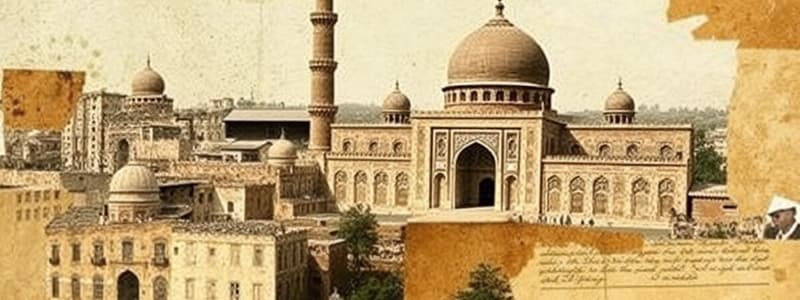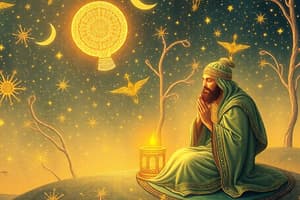Podcast
Questions and Answers
What was the primary way Bedouin tribes interacted before the rise of Islam?
What was the primary way Bedouin tribes interacted before the rise of Islam?
- Engaging in extensive agricultural practices
- Participating in feuds and trade (correct)
- Converting to monotheistic religions
- Establishing permanent settlements
What role did the Quraysh tribe play in pre-Islamic Mecca?
What role did the Quraysh tribe play in pre-Islamic Mecca?
- They were in conflict with the Sassanid Empire.
- They were the primary agricultural producers.
- They spread Judaism among the Bedouin tribes.
- They controlled the pilgrimage trade and the Kaaba. (correct)
Which two empires significantly influenced the culture of the Arabian Peninsula before the rise of Islam?
Which two empires significantly influenced the culture of the Arabian Peninsula before the rise of Islam?
- Mughal Empire and Seljuk Empire
- Roman Empire and Persian Empire
- Byzantine Empire and Sassanid Empire (correct)
- Ottoman Empire and Umayyad Caliphate
What was the significance of the Kaaba in pre-Islamic Arabia?
What was the significance of the Kaaba in pre-Islamic Arabia?
How did many Arabs come to recognize Judaism and Christianity before the rise of Islam?
How did many Arabs come to recognize Judaism and Christianity before the rise of Islam?
What was Muhammad's main profession before receiving revelations?
What was Muhammad's main profession before receiving revelations?
In what year did Muhammad begin receiving revelations from Allah?
In what year did Muhammad begin receiving revelations from Allah?
What major religious text was compiled from Muhammad's revelations?
What major religious text was compiled from Muhammad's revelations?
What term refers to Muhammad as the last prophet in Islam?
What term refers to Muhammad as the last prophet in Islam?
Which of the following is not one of the Five Pillars of Islam?
Which of the following is not one of the Five Pillars of Islam?
What is the major purpose of the hijra in 622?
What is the major purpose of the hijra in 622?
What is the focus of Greater Jihad?
What is the focus of Greater Jihad?
Which event involved Muhammad cleansing the Kaaba of idols?
Which event involved Muhammad cleansing the Kaaba of idols?
What does Sharia law govern?
What does Sharia law govern?
What was a significant outcome of the Battle of Talas in 751 CE?
What was a significant outcome of the Battle of Talas in 751 CE?
Who are referred to as dhimmis under Islamic rule?
Who are referred to as dhimmis under Islamic rule?
Which of the following accurately describes 'Lesser Jihad'?
Which of the following accurately describes 'Lesser Jihad'?
What role did trade play in the spread of Islam?
What role did trade play in the spread of Islam?
What was the Constitution of Medina primarily aimed at achieving?
What was the Constitution of Medina primarily aimed at achieving?
What motivates individuals to convert to Islam, according to the content?
What motivates individuals to convert to Islam, according to the content?
What is the significance of Muhammad as a restorer of the original monotheistic faith?
What is the significance of Muhammad as a restorer of the original monotheistic faith?
Flashcards
Bedouin
Bedouin
Pastoral nomads who lived in the Arabian Peninsula before Islam. They were known for their tribal feuds over resources and their role in trade.
Mecca and Medina
Mecca and Medina
Major trading centers in the Arabian Peninsula that linked the region to other empires and civilizations.
Kaaba
Kaaba
The most important shrine in Mecca, housing idols of numerous gods, before the rise of Islam.
Quraysh
Quraysh
Signup and view all the flashcards
Byzantine and Sassanid Empires
Byzantine and Sassanid Empires
Signup and view all the flashcards
Muhammad
Muhammad
Signup and view all the flashcards
Quran
Quran
Signup and view all the flashcards
Muhammad's Revelations
Muhammad's Revelations
Signup and view all the flashcards
Monotheism in Islam
Monotheism in Islam
Signup and view all the flashcards
Return to Abraham's Faith
Return to Abraham's Faith
Signup and view all the flashcards
Seal of the Prophets
Seal of the Prophets
Signup and view all the flashcards
Umma (Muslim Community)
Umma (Muslim Community)
Signup and view all the flashcards
Five Pillars of Islam
Five Pillars of Islam
Signup and view all the flashcards
Greater Jihad
Greater Jihad
Signup and view all the flashcards
Lesser Jihad
Lesser Jihad
Signup and view all the flashcards
Hijra (Migration)
Hijra (Migration)
Signup and view all the flashcards
Constitution of Medina
Constitution of Medina
Signup and view all the flashcards
Conquest of Mecca
Conquest of Mecca
Signup and view all the flashcards
Fusion of Religious and Political Authority
Fusion of Religious and Political Authority
Signup and view all the flashcards
Sharia Law
Sharia Law
Signup and view all the flashcards
Arab Empire Expansion
Arab Empire Expansion
Signup and view all the flashcards
Battle of Talas
Battle of Talas
Signup and view all the flashcards
Dhimmis (Protected Peoples)
Dhimmis (Protected Peoples)
Signup and view all the flashcards
Study Notes
The Birth of a New Religion
- Pre-Islamic Arabia comprised primarily Bedouin tribes, often in conflict over resources.
- Mecca and Medina were significant trading centers, connecting with various regions.
- Mecca was a key religious, cultural, and commercial hub, centered around the Kaaba.
- The Quraysh tribe controlled the Kaaba and the lucrative pilgrimage trade.
- Arabs were exposed to Christianity and Judaism due to contact with the Byzantine and Sassanid Empires.
- Polytheism was practiced, but Abrahamic faiths (Judaism and Christianity) were also acknowledged.
Muhammad's Message and the Rise of Islam
- Muhammad (570-632 CE) was born in Mecca and received revelations from Allah, forming the Quran.
- Muhammad's message championed monotheism, emphasizing Allah as the sole God.
- He considered himself the final prophet in a line including Abraham, Moses, and Jesus, restoring the faith of Abraham.
- Muhammad is revered as the "Seal of the Prophets."
- Islam stressed social justice, emphasizing the rights of the poor, women, orphans, and marginalized.
- The Five Pillars of Islam are fundamental practices: Shahada (declaration of faith), Salat (prayer), Zakat (charity), Sawm (fasting), and Hajj (pilgrimage)
- "Greater" and "Lesser" Jihad concepts are key to understanding Islamic struggle.
The Transformation of Arabia
- Quraysh opposition to Muhammad led to persecution, culminating in the Hijra (migration to Medina) in 622 CE.
- Muhammad established the Constitution of Medina, uniting tribes under Islamic principles.
- The conquest of Mecca in 630 CE established Islam as a dominant force.
- By Muhammad's death, much of the Arabian Peninsula was unified under Islam.
- Islam fused religious and political authority in the figure of the caliph.
- Sharia law encompassed various aspects of life, drawing from the Quran and Hadith.
The Making of an Arab Empire
- Rapid Islamic expansion reached from the Iberian Peninsula to the Indus River.
- The Battle of Talas (751 CE) saw the Abbasids' victory, transferring Chinese papermaking technology to the Islamic world.
- Economic and religious motives fueled the expansion.
- Dhimmis were protected non-Muslims, but subject to the jizya tax.
Conversion to Islam
- Conversion to Islam had both spiritual and social motivations.
- Slaves, prisoners of war, and merchants were among those who converted.
- Conversion occurred in many regions without full Arabization, especially regions like Persia, Turkey, and Pakistan.
Studying That Suits You
Use AI to generate personalized quizzes and flashcards to suit your learning preferences.




